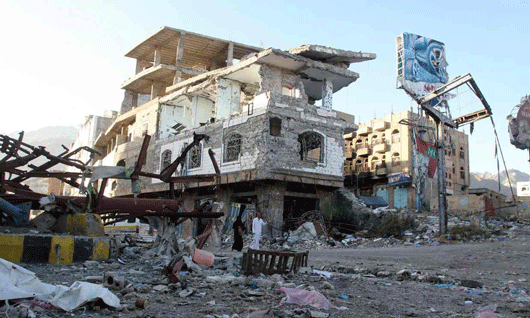
By Bonnie Kristian
Just last week, a human rights watchdog reported that a single airstrike in Yemen in March killed nearly 100 innocent civilians, some 25 of them children. The strike was conducted by Saudi Arabia, but it was done with American-supplied weapons and positioning technology.
Shortly before that, we learned of a murderous raid on a hospice for the elderly founded by Mother Teresa herself, an attack which left 16 people dead, including four nuns who managed the facility. The incident was an "act of senseless and diabolical violence," said Vatican Secretary of State Pietro Parolin, and Pope Francis "prays that this pointless slaughter will awaken consciences, lead to a change of heart and inspire all parties to lay down their arms and take up the path of dialogue."
One way to further that goal-while strengthening American security-is stop the flow of U.S. support to the Saudi Arabian side of Yemen’s conflict.
What many Americans don’t realize is that our government has been quietly funneling guidance, intelligence, and weaponry to the Saudi intervention. Our navy is patrolling the coast..., and our tanker planes are refueling Saudi jets.
"It is now clear that AQAP has been a significant beneficiary of the chaos unleashed...," said one U.S. counterterrorism official. "While the Saudi-led coalition has started to push back the Houthis, they are not able to simultaneously fight AQAP. The net result is that AQAP continues to make inroads and exploit the situation."
Aaron Zelin, an expert in ... extremist movements at the Washington Institute for Near East Affairs, agrees. "AQAP has been slowly building up capacity," since the U.S.-backed Saudi intervention began, he says. "They are stronger."
Making this growth particularly worrisome is that-unlike ISIS, which is more interested in accumulating territory in the Middle East-AQAP is explicitly focused on striking targets on the U.S. mainland.
"Direct your spears towards America," an AQAP leader urged his followers in August. "Keep pursuing your efforts and do not halt your jihad, until we make America taste what the Muslim nation has tasted."
The longer the U.S. continues to back Saudi intervention in Yemen, the easier we make AQAP’s despicable plots.
Meanwhile, Yemen itself is a wreck. Civilian casualties are mounting. Some 94 percent of Yemenis say they are "suffering" or "struggling" under current conditions. Food and medicine are in short supply, with more than half the population affected by malnutrition. And 45 percent have lost their main source of income thanks to the upheaval of the current war, which makes them prime targets for terrorist recruiters. Idle hands, as they say, are al Qaeda’s workshop.
This is particularly true for Yemen, where resentment has already been building for years thanks to the Obama Administration’s drone war. "I have to say that the drone strikes and the targeted killing program have made my passion and mission in support of America almost impossible in Yemen," one Yemeni man testified before Congress in 2013. Thanks to drone warfare, he added, "What radicals had previously failed to achieve in my village, one drone strike accomplished in an instant: there is now an intense anger and growing hatred of America."
And, "If you think none of this affects you or the United States, think again," says Stephen Seche, a former U.S. ambassador to Yemen who was nominated by President George W. Bush. The "underwear bomber," for instance, was from Yemen. Now, with AQAP on the rise, fostering instability in Yemen by supporting Saudi Arabia’s war makes both Americans and ordinary Yemenis less secure.
Ultimately, U.S. facilitation of the Saudis’ "relentless punishment of Yemen"-a project that almost certainly could not endure without our support-directly undermines efforts to achieve a negotiated resolution. As a result, Seche argues, "the unintended consequences of [the Saudi] war in Yemen have made not just the region, but the world, less safe."
Further U.S. backing of Saudi intervention means that instability and danger will only grow.
Source: Rare, Edited by Website Team